虚拟语气-1..
虚拟语气1

money,I might buy a phone here now,we could tell him this good news you,I wouldn't do that a brother,I could ask him for help
tommorow,we would call off the class to rain tommorow,we’d call off the class tommorow,we would call off the class
虚拟语气1
序 中文
主 谓/系
1 如果你没起那么晚的话,你本来该完成作业的 If you hadn't got
2 如果我昨天早到些,那个孩子是可以被救时不会对他那么生气的 If you had told
4 如果我早知道他是这种人,我不会帮他的
If I had konwn
If it If it If it
rained were should rain
虚拟语气1 宾/表/其他 up so late,you should've finished your homework there earlier,that kid could have been saved me earlier,I wouldn't have been so angry with him that he was this kind of person,I wouldn't have helped him
5 如果我有钱的话,我可能会买个手机
If I
6 如果他现在在这的话,我们就能告诉他这个好 If he
7 如果我是你的话,我不会那样做的
If I
9.18.虚拟语气(1)

I wish I _h_a_d_n_'t__e_at_e_n(eat) so much watermelon yesterday.
as if/as though 虚拟用法同wish
他那样对待我, 好像我是陌生人似的。
He treats me as if I _w_e_r_e a stranger.
• 2. 定义:用来表示说的话不是事实, 或者是不可能发生或可能性比较小的 情况,而是一种愿望,建议,假设的 语气叫虚拟语气。
虚拟语气
Types
1. If 型
与现在事实相反虚拟
If I were a bird, I would have two wings. If I had two wings, I could fly in the sky.
He talks about Rome as if he
_h_a_d_b_e_e_n_(be) there before.
if only 虚拟用法同wish:
Had you come earlier, you would have met him.
If it should rain tomorrow, we would not go climbing.
Should it rain tomorrow, we would not go climbing.
虚拟语气
虚拟语气
高考命题趋势
高考对虚拟语气的考查侧重于:在非真 实条件状语从句中的使用,含蓄条件 句中的用法,名词从句中的用法及一 些特殊句式中的用法。今后高考仍然 会重视对虚拟语气句型的考查,而且 试题语境会更灵活,考查角度更加多 样化。我们要在语境中准确理解运用 。
知识目标
1 会使用if 条件句中虚拟语气句式 2 能使用虚拟语气的几种特殊句式造句
虚拟语气1

If引导的虚拟语气用于非真实条件句
❤与现在事实相反:从句用“动词的过去式(be动词一律用were)”
主句用“would/could/should/might + 动词原形”
如果我有时间,我就会参加你的晚会。
例句:If I had time, I would attend your party.
❤与过去事实相反:从句用“had + 过去分词”
主句用“would/could/should have + 过去分词”
你当时不让我来开车。
如果我们轮流开车,你就不会觉得那么累。
例句:You didn’t let me drive. If we had driven in turn, you wouldn’t have got so tired.
❤与将来事实相反:从句用“动词的过去式;should + 动词原形; were to + 动词原形”
主句用“would/could/might/should + 动词原形”
如果明天下雪,我们就照相。
❤混合虚拟条件句:如果条件从句的动作和主句的动作不是同时发生,主句和从句的谓语动词的形式应分别根据各自所表示的时间加以调整。
If I were as clever as you think, I should have been rich by now.
如果我像你想得那么聪明,现在就会很富有了。
(从句是真实条件句,主句是虚拟语气)
If you had worked hard, you would be very tired now.
如果你真的努力工作了,你现在就会感到很累的。
(从句指过去,主句指现在)。
【英语】英语专题汇编英语虚拟语气(一)及解析
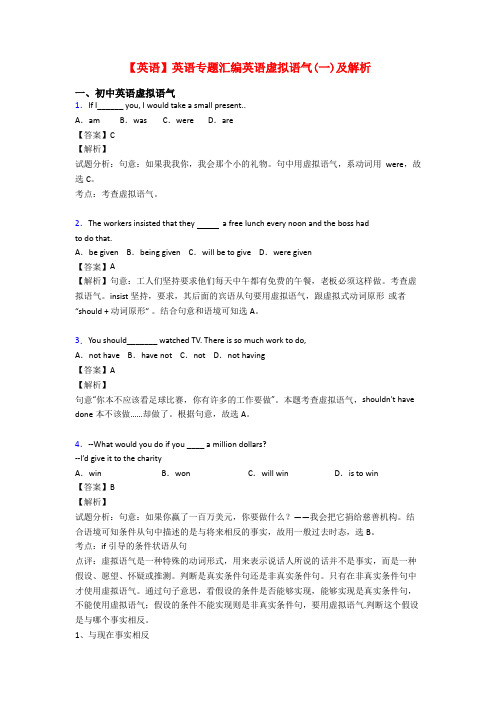
【英语】英语专题汇编英语虚拟语气(一)及解析一、初中英语虚拟语气1.If I______ you, I would take a small present..A.am B.was C.were D.are【答案】C【解析】试题分析:句意:如果我我你,我会那个小的礼物。
句中用虚拟语气,系动词用were,故选C。
考点:考查虚拟语气。
2.The workers insisted that they a free lunch every noon and the boss hadto do that.A.be given B.being given C.will be to give D.were given【答案】A【解析】句意:工人们坚持要求他们每天中午都有免费的午餐,老板必须这样做。
考查虚拟语气。
insist坚持,要求,其后面的宾语从句要用虚拟语气,跟虚拟式动词原形或者“should + 动词原形” 。
结合句意和语境可知选A。
3.You should_______ watched TV. There is so much work to do,A.not have B.have not C.not D.not having【答案】A【解析】句意“你本不应该看足球比赛,你有许多的工作要做”。
本题考查虚拟语气,shouldn't have done本不该做……却做了。
根据句意,故选A。
4.--What would you do if you ____ a million dollars?--I’d give it to the charityA.win B.won C.will win D.is to win【答案】B【解析】试题分析:句意:如果你赢了一百万美元,你要做什么?——我会把它捐给慈善机构。
结合语境可知条件从句中描述的是与将来相反的事实,故用一般过去时态,选B。
考点:if引导的条件状语从句点评:虚拟语气是一种特殊的动词形式,用来表示说话人所说的话并不是事实,而是一种假设、愿望、怀疑或推测。
虚拟语气+讲解课件-2025届高三英语上学期一轮复习专项
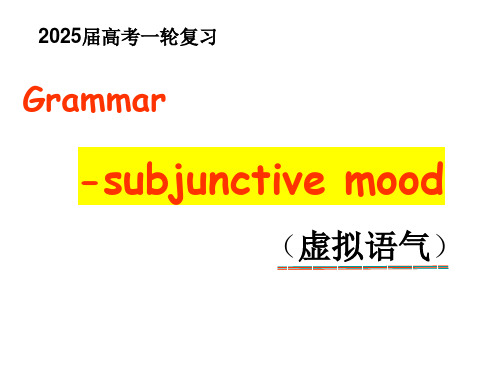
should型虚拟语气应用作文好句欣赏
• It is important that we should work out a study plan.
• 重要的是我们要制订出一个学习计划。
• (应用文之建议信)
• In the end, i’d like to say that whatever you do, it is suggested that you should devote yourself to doing it well.
• 如果没有你的帮助,我不能取得这么大的进步。
(应用文之感谢信)
2. "If you had been more careful, our daughter would not have been lost", she couldn't contain her anger and shouted at her husband. “如果你更加细心一些,我们的女儿就不会走丢”, 她抑制不住怒火,朝她丈夫喊道。 (读后续写情绪描写之愤怒)
我宁愿你现在付钱给我。
me now.
Don’t come. I would rather you came
tomorrow. 不要来。我宁愿你明天过来。
几种特殊结构虚拟语气应用作文好句欣赏
It is high time that we should take measures to protect the environment. 是时候采取行动来保护环境了。(应用文写作之倡议书)
come here now.
如果他们通知过我们的话,我们现在就不会来
这里了。
(与过去事实相反)
(3)If it rained/were to rain/should rain
英语虚拟语气总结(一)
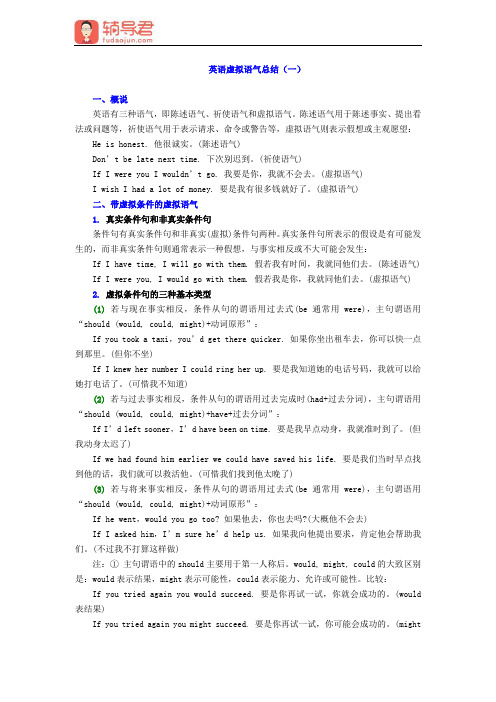
英语虚拟语气总结(一)一、概说英语有三种语气,即陈述语气、祈使语气和虚拟语气。
陈述语气用于陈述事实、提出看法或问题等,祈使语气用于表示请求、命令或警告等,虚拟语气则表示假想或主观愿望:He is honest. 他很诚实。
(陈述语气)Don’t be late next time. 下次别迟到。
(祈使语气)If I were you I wouldn’t go. 我要是你,我就不会去。
(虚拟语气)I wish I had a lot of money. 要是我有很多钱就好了。
(虚拟语气)二、带虚拟条件的虚拟语气1.真实条件句和非真实条件句条件句有真实条件句和非真实(虚拟)条件句两种。
真实条件句所表示的假设是有可能发生的,而非真实条件句则通常表示一种假想,与事实相反或不大可能会发生:If I have time, I will go with them. 假若我有时间,我就同他们去。
(陈述语气) If I were you, I would go with them. 假若我是你,我就同他们去。
(虚拟语气)2.虚拟条件句的三种基本类型(1)若与现在事实相反,条件从句的谓语用过去式(be通常用were),主句谓语用“should (would, could, might)+动词原形”:If you took a taxi,you’d get there quicker. 如果你坐出租车去,你可以快一点到那里。
(但你不坐)If I knew her number I could ring her up. 要是我知道她的电话号码,我就可以给她打电话了。
(可惜我不知道)(2)若与过去事实相反,条件从句的谓语用过去完成时(had+过去分词),主句谓语用“should (would, could, might)+have+过去分词”:If I’d left sooner,I’d have been on time. 要是我早点动身,我就准时到了。
虚拟语气1
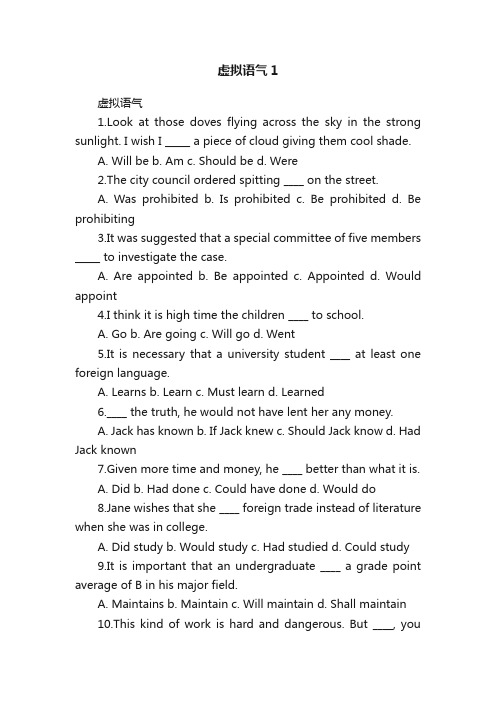
虚拟语气1虚拟语气1.Look at those doves flying across the sky in the strong sunlight. I wish I _____ a piece of cloud giving them cool shade.A. Will be b. Am c. Should be d. Were2.The city council ordered spitting ____ on the street.A. Was prohibited b. Is prohibited c. Be prohibited d. Be prohibiting3.It was suggested that a special committee of five members _____ to investigate the case.A. Are appointed b. Be appointed c. Appointed d. Would appoint4.I think it is high time the children ____ to school.A. Go b. Are going c. Will go d. Went5.It is necessary that a university student ____ at least one foreign language.A. Learns b. Learn c. Must learn d. Learned6.____ the truth, he would not have lent her any money.A. Jack has known b. If Jack knew c. Should Jack know d. Had Jack known7.Given more time and money, he ____ better than what it is.A. Did b. Had done c. Could have done d. Would do8.Jane wishes that she ____ foreign trade instead of literature when she was in college.A. Did study b. Would study c. Had studied d. Could study9.It is important that an undergraduate ____ a grade point average of B in his major field.A. Maintains b. Maintain c. Will maintain d. Shall maintain10.This kind of work is hard and dangerous. But ____, youwould become rich.A. Would you succeed b. Could you succeedC. Might you succeed d. Should you succeed11.The teacher recommended that Jack ____ maths or physics instead of English because he was quick at numbers.A. Must study b. Could study c. Studied d. Study12.The dean approved of the requirement that every student ____ a report on social investigation after summer vacation.A. Handed in b. Hand in c. Must hand in d. Ought to hand in13.I’d rat her you just ____ in bed and ____ anything for at least two weeks.A. Stayed/ did b. Stay/ don’t c, stayed/ don’t do d. Stayed/ didn’t do14.Without your encouragement and support, we ____.A. Should not succeed b. Would not succeedC. Would have succeed d. Would not have succeeded15.Since she suffered a great deal from stomachache, the doctor insisted that he ____ wine any more.A. Did not drink b. Does not drink c. Not drink d. Could not drink16.The same thing, happening in war time, ____ great disaster.A. Will amount to b. Amounted to c. Would have amounted to d. Would amount to17.The doctor urged that she ____ an operation as early as possible.A. Had b. Has c. Have d. Would have18.If I ____ the job, I would do it in a different way.A. Would do b. Do c. Shall do d. Were to do19.He ____ ten lectures on American history, but he only gave two because of his illness.A. Had given b. Gave c. Should have given d. Must have given20.It is imperative that she ____ medicine instead of literature.A. Study b. Studies c. Would study d. Was to study21.Any man in his position ____ like that .A. Have done b. Would have done c. Would be done d. Would be doing22.he would be a model worker now if he ____ harder.A. Worked b. Should work c. Would have worked d. Had worked23.I’d rather that she ____ me not to do it then, but it is too late.A. Would tell b. Was c. Had told d. Would have told24.It is so wonderful a place that she feels as if she ___ in a paradise.A. Is b. Was c. Were d. Could be25.If only I _____ his advice! But what a pity!A. Took b. Had taken c. Should take d. Take26.____ for their support, he would have gone bankrupt.A. If it is not b. If it should not be c. Weren’t it d. Had not it been27.The teacher insisted that he ____ the paper within the week.A. Finishes b. Finish c. Finished d. Could finish28.I’d just soon ____ him any longer.A. We don’t wait for b. That we won’t wait forC. We didn’t wait for d. We are not waiting for29.The teacher asked that everyone ____ a report on the present economic situation in the countryside.A. Wrote b. Writes c. Had written d. write30.It is natural that an employee _____ his work on time.A. Finishes b. Can finish c. Finish d. Has finished主谓一致1. More than one person ___ been infected with the disease.A.Have b. Having c. Has d. To have2.The number of accidents on roads ____.A.Were increased b. Are increased c. Have been increased d. Has increased3.We got ____ necessary from Terry.A.All the information b. All information c. All of the information d. All of the informations4.You, who ___ ready to offer him your assistance, are a true friend of his.A.Is b. Was c. Are d. Has been5.Many a man ____ life is meaningless without a purpose.A.Think b. Thinks c. Thinking d. Have thought6.At the bus stop ____ a soldier and two strong young people on the way to North Carolina.A.Were b. Was c. Is c. Sits and waits7.Fertilizers are used primarily to enrich the soil and ____ yield.A.Increase b. Increasing c. To increase d. Increased8.I was advised ____ for reservation.A.To either telephone or to write the hotel b. Either to telephone or to write the hotelC. That I should telephone or either write the hotelD. I ought either to telephone or write the hotel9.Neither his training nor his experience as a railway engineer ____ him for his job.A.Qualify b. Qualifies c. Qualifying d. To qualify10.This article deals with the natural phenomenon which ____ most interesting to everyone.A.Is b. Was c. Are d. Were11.Sitting up late last night, Tom ____ the assignment but also many poems by one of his favourite poets.A.No only read b. Only doesn’t read c. Read not only d. Only read12.Not one in one hundred children exposed to the disease ____ likely to develop it.A.Is b. Are c. Should be d. Must be13.The group ____ waiting for ____ plane to Paris.A.Are...its b. Is...their c. Are...his d. Is ..its14.Neither of the alternatives that had been outlined at the last meeting ____ acceptable to the executive committee.A.Are b. Were c. Will d. Was15.The president of the college, together with the deans, ____ planning a conference for the purpose of laying down certain regulations.A.Are b. Were b. Will d. Is16.Whoever inspected ____ radio should have put ____ identification number on the Box.A.This...their b. That...their c. His....this d. This. (i)17.Not one in our class ____ in sports than he.A.Are more interested b. Are much interested c. Is much interested d. Is more interested18.If one had taken the time to review the lesson, _____ would have passed the exam.A.You b. We c. He d. It19.The exhibition has requested that each student and teacher sign ____ on the gate sheet before visiting.A.Their name b. Their names c. His names d. His name20.Every man and woman should vote for the candidate of____.A.Their choice b. Their choices c. Her choice d. His choice21.There ____ not only the earth but also eight planets in the solar system.A.Are b. Were c. Is d. Was22.The examination will test you ability ____ spoken English, ____ nontechnical language, and ___ correctly.A.Understand...read...write b. Understanding...reading....writingC. To understand....to read....writing d. To understand....to read...to write23.Jack is so poor that even five dollars ____ a big sum to him.A.Is b. Are c. Add d. Equal24.It is not you but I who ____ the first to run to the goal in the competition.A.Is b. Am c. Are d. Was25.Part of the books ____ arrived.A.Is b. Have c. Was d. Has26.Nearly all trees have seeds that fall to the earth, take root, and eventually ____.A.Generate new seeds b. New seeds generatedC. By generating new seeds d. New seeds generated there27.Mary’s sun-tanned face is a suggestion that she ____ in excellent health.A.Be c. Being c. Is d. Was28._____ to finish quickly.A.No every student wants b. No every student wantC. Not every student wants d. Not every student want29.Every means ____ been tried since then.A.Has b. Have c. Are d. Is30.The office staff ____ gathered to hear the president speak.A.Is b. Are c. Be d. Will31.The total number of articles published on cancer____ amazing.A.Are b. Is c. Have been d. Be32.A large number of cars ____ parked in front of my house.A.Is b. Are c. Was d. Has33.There ____ in this room.A.Are too many furnitures b. Are too much furnitureC. Are to much furnitures d. Is too much furniture34.The wheel and axle ____ a rotating lever.A.Is b. Was c. Are d. Were35.Ignorance and negligence ____ this mistake.A.Cause b. Have caused c. Has caused d. Are caused36.Truth and honesty ____ always best policy.A.Are b. Is c. Have been d. Become37.No sulfur and no phosphorus _____ present in this product.A.Are b. Were c. Will d. Is38.Every hour and every minute _____ important.A.Are b. Were c. Is d. Will39.About half of them ____ the usual standard.A.Is up to b. Was up to c. Are up to d. Approaches to40.Half of a circle _____ a semicircle.A.Are b. Were c. Is d. Was41.One and a half years ____ passed.A.Are b. Were c. Have d. Has42.To flow and not to possess definite shape ____+ the general property of liquids.A.Is b. Are c. Was d. Were43.To review and assess achievements and summarize andexchange experience ___ the task of our present congress.A.Are b. Is c. Were d. Have been44.A portion of the waves _____ then reflected from the object encountered.A.Is b. Are c. Have d. Were45.What is large and what is small ____ only relative.A.Is b. Are c. Was d. Were倒装1.In each room _____ ten students.A.Are b. Is c. There is d. There was2._____ from the tenth floor when the policeman pointed his pistol at him.A.Jumped down the burglar b. Down the burglar jumpedC. The burglar jumped down d. Down jumped the burglar3.______do we go picnics.A.Certainly b. Sometimes c. Seldom d. Once4.Only when you have acquired a good knowledge of grammar ____ write correctly.A.You will b. You can c. Can you d. Can’t you5.They have all got up, and ____.A.Jack has too b. So has Jack c. Jack hasn’t d. Also has Jack6.Wood does not conduct electricity, ____.A.So doesn’t rubber b. Also doesn’t rubber c. Nor does rubber d. Nor rubber does7.Not only ____ be proved interesting to us, but also its English will help us in composition.A.The novel will b. Will the novel c. Is the novel d. The novel is8.Little ____ of passing the coming examination.A.I thought b. I think c. Did I think d. Shall I think9.Hardly ____ his speech ____ the audience started cheering.A.Did he finish...than b. Dies he finish...before c. Have he finished...while d. Had he finished when10.We fail to see air, ____.A.So they do b. So they do c. Neither they do d. Neither do they11._____ about phonetics for you to read.A.A book is b. Here is a book c. Here a book is d. There the book is12.Where is the man we talked about yesterday?There ____.A.He comes b. Comes he c. He came d. Came he13.Then ____ of that time when he was a cowboy./doc/3716066625.html,es the memory b. The memory comesC. Came the memory d. The memory came14.Busy ____ he is, he can fulfill the task ahead of schedule.A.Because b. As c. No matter how d. Although15.____ a research student, I would at least master two foreign languages.A.Should I become b. I should become c. Would I become d. Have I become16.___, you won’t be able to do it alone.A.However you try hard b. You try hard howeverC. However hard you try d. Hard you try however17.No sooner had he found his purse missing____ he cried and shouted loudly.A.When b. Than c. Before d. While18.Often ___ not to touch the poisonous chemical.A.Does Ford warn us b. Ford warned usA.Ford warns us d. Has Ford warned us19.By no means ____ create or destroy energy.A.We can b. We can’t c. Can we d. Shall we20.Against the wall on the opposite side____.A.There stand two cupboards b. Two cupboards stand thereC. There two cupboards stand d. Stand two cupboards21.Rarely ____ such a silly thing.A.Have I heard of b. I have been heard ofC. Have I been heard of d. I have been heard of22.Then ____ we had been looking forward to.A.Came the hour b. The hour came c. Comes the hour d. The hour is coming23.____ that the pilot could n’t fly through it.A.The storm so severe was b. So severe was the stormC. So the storm was severe d. Such was the storm severe24.That English fellow’s songs are very poetic._____ the words to the songs, but he also composes the music.A.He also writes b. Although he writes c. Not only does he write d. It is not all that he writes25.Not only ____ difficult to light, but it smelled of oil.A.It was b. It made c. Did it make d. Was it26.____ that this region was so rich in natural resources.A.Little he knew b. Little did he know c. Little did he know d. Little he had known27.Never again ____ political office after his 1928 defeat for the presidency.A.Alfred E. Smith seriously sought b. Seriously Alfred E. Smith soughtC. When did Alfred E. Smith seriously seek d. Did Alfred E. Smith seriously seek28.All substances, ___, are made up of atoms.A.Whether they gaseous, liquid or solid b. They are gaseous, liquid or solidC. They should be gaseous, liquid or solid d. Be they gaseous, liquid or solid29.Only in recent years ____ begun to realize that wild dogs, kept within bounds, often do more good than harm.A.People have b. Since people have c. Have people d. People who have30.Not until I shouted at the top of my voice ___ his head.A.That he turned b. Di d he turn c. He didn’t turn d. He had turned31.Her answer is not acceptable, and ____.A.Neither am I b. Either is mine c. Neither is mine d. Mine is neither32.So little ____ about mathematics that the lecture was completely beyond me.A.I know b. I knew c. Do I know d. Did I know33.Doctors, lawyers, teachers and barbers are productive, ____ actors, musicians, entertainers and others who perform services for our benefit.A.As is b. As are c. As was d. As were34. So fast ____ that it is difficult for us to imagine its speed.A.Light travel b. Travels the light c. Do light travel d. Does light travel35.All magnets behave the same, ____ they large or small.A.Whether are b. Will c. Be d. Should36.Only after the invention of television ____ be sent from one place and viewed in another.A.A picture with its sound will b. With its sound a picture canC. Can a picture with its sound d. A picture can with its sound37.Under no circumstances ___ the trip.A.Shall we cancel b. We have to cancel c. We should canceld. We cancel38.In no way ____ in the water show the amount of heat the water contains.A.A thermometer placed b. A thermometerC. Does a thermometer put d. A thermometer place39.Not until the early years of the 19th century ____ what heat is.A.Man knew b. Did man know c. Man had known d. Does man know40.Never ____ inside the sun.A.Nuclear reactions stopped b. Nuclear reactions have stoppedC. Had nuclear reactions stopped d. Have nuclear reactions stopped41.Little ____ that the district was so rich in mineral resources.A.We suspect b. We suspected c. Did we suspect d. We do suspect42.Often ____ that test.A.We try b. do we tried c. Have we tried d. We tried43.Well ____ the story he told me ten years ago.A.I remember b. I remembered c. Do I remember d. I do remember44.In vain ___ to give up smoking.A.We try to persuade him b. We tried to persuade himC. Did try we to persuade him d. Did we try to persuade him45.Many a time ____ good advice.A.He gave me b. He had given me c. Has he given me d. Hehas given me46.Surrounding the earth ____ air of unknown thickness.A.A layer of b. A layer is of c. Is a layer of d. Of a layer is47.Constantly growing too ____.A.The volume of consumer goods is b. Is the volume of consumer goodsC. Are the volume of consumer goods d. The volume of consumer goods are时态1.Many years ago, Jim ____ in Paris with his uncle for a long period of time.A.Had been living b. Had lived c. Lived d. Has been living2.They ____ the trip until the rain stopped.A.Continued b. Didn’t continue c. Hadn’t continue d. Would continue3.You shouldn’t have asked the boy to run across the street to buy cigarettes, he ____ by a passing car.A.May be knocked down b. Should have been knocked offC. Might have been knocked down d. Will have been knocked down4.The girl even won’t have her lunch before she ____ her homework.A.Will finish b. Has finished c. Had finished d. Finished5.The local peasants gave the soldiers clothes and food without which they ____ of hunger and cold.A.Would die b. Will die c. Would be dead d. Would have died6.After driving for thirty miles, she suddenly realized that she ___ in the wrong direction.A.Was driving b. Has been driving c. Had been driving d. Drove7.It is not like Jack to be unfriendly, so he ____ you when you called.A.Had not seen b. Should not have seenC. Must not have seen d. Did not see8.By the time you get back, great changes ____ in this area.A.Will take place b. Will be taken lace c. Are going to take place d. Will have taken place9.On his next birthday he ____ married for ten years.A.Has been b. Will be c. Will have been d. Would have been10.Those who have applied for the post ____ in the office.A.Are being interviewed b. Are interviewing c. Interviewing d. To be interviewing11.John ____ now for the light in his room is still on.A.Must study b. Must be studying c. Must have studied d. Would have studied12.Father doesn’t know I have been gambling; if he found out, I think ___ me out of home.A.He will drive b. He drove c. He’d drive d. He must have been driving13.The sportsman ____ training for three hours when the coach told them to break off for rest and supper.A.Have been b. Are c. Had been d. Were14.The prices ____ going up all the time in the past few years so that complaints can be heard everywhere.A.Keep b. Kept c. Have kept d. Are15.The Yellow River ___ to be the cradle of the Chinese nation.A.Can say b. Can be said c. Could say d. Said16.I would like to do it right now, but I ____ time.A.Hadn’t b. Didn’t have c. Will have no d. Have no17.It was not until then that I came to know that the earth____ around the sun.A.Moved b. Has moved c. Will move d. Moves18.Jack was fined for speeding. He ____ so fast.A.Should have driven b. Could have drivenc. Shouldn’t have driv end. Wouldn’t have driven19.When she graduates from the college this summer, she ____ here for four years.A.Will study b. Will be studying c. Will have studied d. Has studied20.The roads are all wet. It ____ last night.A.Must rain b. Must be raining c. Had to rain d. Must have rained21.If you had studied harder in those years, you ____ a university student now.A.Should be b. Could have been c. Would be d. Might have been22.The old scientist ___ to do more for the country.A.Is wishing b. Has been wishing c. Wishes d. Has been wished23.The computer does not work well, so something ____ wrong.A.Goes b. Will go c. Would have gone d. Must have gone24.The meeting is scheduled to begin at 7 o’clock.But ____ a delay.A.It will be b. There’d be c. There will be d. There’s25.If you ____ see Mr. Lambert, give him my regards.A.Will b. Would c. Should d. Shall26.Jim’s score on the test is the highest; _____ hard.A.He should have studied b. He could have studiedc. He must have studiedd. He could study27.You did not hear my knocking at the door; you ____ soundly when I came in.A.Sleep b. Have slept c. Have been sleeping d. Must have been sleeping28.For the whole period of two months, there ____ no rain in this area. Now the crops are withered.A.Is b. Will be c. Has been d. Have been29.It ___ almost everyday so far this month.A.Is raining b. Rained c. Rains d. Has been raining30.She told me her name only after I ____ twice.A.Ask b. Asked c. Had asked d. Have asked31.He said that he____ since two o’clock that morning.A.Was writing b. Wrote c. Has been writing d. Had been writing32.He will leave for Paris before you ____ next week.A.Will come back b. Will be back c. Come back d. Came back33.Is he studying for an examination?Yes, he’s ___ it next Friday.A.To take b. Doing c. Making d. To give34.Are you going to see the film tonight?Yes. By then I ____ my homework.A.Shall finish b. Finish c. Have finished d. Will have finished35.When all those present____, he began his lecture.A.Sit b. Set c. Seated d. Were seated36.Jack was going out of the shop when he collided with an old woman who ___ in./doc/3716066625.html,e b. Was coming c. Had been coming d. Had come37.Today is Jane’s wedding day. She ___ John.A.Had just married with b. Was just married toC. Has just been married to d. Just has been married to38.People ____ life as a journey./doc/3716066625.html,ed to considering b. Use to considerc. Have been used to consideringd. Have used to consider39.Fashions in America before the 19th century ___ those of England.A.Followed usually b. Have usually followed c. Had usually followed d. Following usually40.How sweet the music is! Someone ___ the piano in the neighborhood.A.Must play b. Must have been playing c. Must be laying d. Will play41.No wonder those flowers have withered, they ____ any water for ages.A.Hadn’t b. Haven’t c. Haven’t had d. Hadn’t had42.She wrote to me that she would come to see me when she ____ the job.A.Would finish b. Has finished c. Would have finished d. Had finished43.The manager told the applicants that they should not leave until he ___ a talk with each of them.A.Would have b. Has had c. Had had d. Would have had44.I am sorry to have begun the meeting before you came. I thought ____.A.You did not come b. You should not come c. You were not coming d. You are not coming45.If he ___, don’t wake him up.A.Still sleeps b. Is still sleeping c. Still has been sleeping d. Will be sleeping still46.Had you had a chance to see him, what ____ to him?A.Did you say b. Would you say c. Would you have said d. Would you be saying47.I don’t know we ___ again. I ____ her ever since I graduated from the college.A.Shall meet.. Didn’t see b. Would meet.... Haven’t seenC. Shall have met... Will not see d.shall meet....haven’t seen48.If he gets the new book published this year, he_____ten books in the past twenty years.A.Will publish b. Will have published c. Would publish d. Has published49.Our next meeting ____ on 1st December.A.Has been held b. Will hold c. Is to be held d. Is holding50.The bridge ____ at the moment, so we had to take another way.A.Had been repaired b. Was repaired c. Would have been repaired d. Was being repaired51.Can you attend the meeting tonight? No, ___ the manager about something urgent.A.I see b. I shall have seen c. I’ll be seeing d. I can see52.You are drunk again. You ____ so much.A.Ought not to have drunk b. ought to have drunkC. ought not drink d. Ought not to be drunk53.She ___ supper when she ____ someone knocking at the door.A.Made...heard b. Was making... Was hearing c. Made...was heard d. Was making...heard54.Please come in. We ____ about your paper.A.Talk b. Had been talking c. Have been talking d. Would have talked55.Not until then did people know that he ____ important military information to the enemy for a long time.A.Sold b. Would sell c. Has sold d. Had been selling56.The moment he mailed the letter, he was sorry that he ___ it.A.Wrote b. Had been writing c. Had written d. Was writing57.Such natural resources as coal and petroleum___.A.Gradually are exhausted b. Are being gradually exhaustedC. Have gradually exhausting d. Have been exhausting gradually58.You can close your umbrella. The rain seems ___.A.To stop b. To have stopped c. To have been stopped d. Having stopped59.Of the millions who saw Haley’s comet in 1986, how many people ____ long enough go see it return in the twenty-first century?A.Will they live b. They will be living c. Will live d. Living60.The law requires the employers to pay the wakes that they ____ the workers.A.Owe b. Should owe c. Are owing d. Have owed61.There is a warning to stay away from the machine while it ____.A.Was spinning b. Has been spinning c. Is spinning d. Will spin62.It ___ a long time before we see each other again.A.Will be b. Is c. Has been d. Would have been63.Michiko couldn’t come to the telephone when Mrs.Sakuda called her because she ___ in the lab.A.Had been working b. Has been working c. Was working d. Worked.64.They were friends sharing weal and woe, for they ____ each other’s life.A.Were saved b. Should save c. Have saved d. Had saved65.Nowadays computer ____ a wide application with the development of production and science.A.Found b. Has found c. Finds d. Had found66.Shakespeare ___ many famous plays.A.Was writing b. Wrote c. Has been writing d. Had written67.What a lovely night! The moon ____ brightly.A.Shines b. Shined c. Is shining d. Was shining68.Charles ____ her but he changed his mind.A.Would be calling b. Would have called c. Was pleased to calling d. Was going to call69.On television last night the newscaster announced that the leader ___ on Saturday.A.Is arriving b. Will arrive c. Would be arrived d. Would be arriving70.I was ____ work last week, but I caught a bad cold.A.To start b. To have started c. T o be starting d. T o have been starting71.Ellie can’t have left the office at five, or ____ home by now.A.She’ll get b. She’d get c. She will have got d. She’d have got72.Where ____ a will, there is a way.A.There will have b. Has been there c. There is d. There has been。
虚拟语气1

四、用在as if/ as though引导的方式状语从句中 用在 引导的方式状语从句中 She loves the orphan as if he were her own son. He talked as if he had known everything. 五、It is (high/ about) time that…(用过去时) that…(用过去时 用过去时) It is high time we began to work. It is high time that we should begin to work. It is time that children went to school. It is time that children should go to school.
*可以把 省略,将were, had, should 可以把if省略 可以把 省略, 提前, 提前,构成倒装 Should it rain tomorrow, we would stay at home. Were it to rain tomorrow, we…. Had I not taken your advice, I would have made a bad mistake.
二、在非真实条件句中(所提出的假设 在非真实条件句中( 实现的可能性极小或与事实相反) 实现的可能性极小或与事实相反) (1)与现在事实相反 (1)与现在事实相反 I would go if I had time. If there were no air, people would die. (2) 与过去事实相反 If you had got there earlier, you would have caught the bus. If I had not taken your advice, I would have made a bad mistake.
英语虚拟语气(一)解题方法和技巧及练习题及解析

英语虚拟语气(一)解题方法和技巧及练习题及解析一、初中英语虚拟语气1.If I _____you. I would wear jeans to the party.A.am B.was C.were D.are【答案】C【解析】试题分析:句意:如果我是你,我就穿牛仔裤去宴会。
与现在事实相反的虚拟语气中,系动词一律用were。
故选C。
考点:考查虚拟语气。
2.--- If I_______ one million dollars, I would give it to medical research.---If I _______ you, I would give it to charity.A.will have, am B.would have, was C.had, were D.have, is【答案】C【解析】考察虚拟语气。
第一空,虚拟语气,与现在相反,用过去时。
第二空,虚拟语气,与现在相反,用过去时,be动词用were。
故选C3.--What would you do if you ____ a million dollars?--I’d give it to the charityA.win B.won C.will win D.is to win【答案】B【解析】试题分析:句意:如果你赢了一百万美元,你要做什么?——我会把它捐给慈善机构。
结合语境可知条件从句中描述的是与将来相反的事实,故用一般过去时态,选B。
考点:if引导的条件状语从句点评:虚拟语气是一种特殊的动词形式,用来表示说话人所说的话并不是事实,而是一种假设、愿望、怀疑或推测。
判断是真实条件句还是非真实条件句。
只有在非真实条件句中才使用虚拟语气。
通过句子意思,看假设的条件是否能够实现,能够实现是真实条件句,不能使用虚拟语气;假设的条件不能实现则是非真实条件句,要用虚拟语气.判断这个假设是与哪个事实相反。
1、与现在事实相反若与现在事实相反,条件从句的谓语用过去式(be通常用were),主句谓语用“should (would, could, might)+动词原形”2、与过去事实相反若与过去事实相反,条件从句的谓语用过去完成时(had+过去分词),主句谓语用“should (would, could, might)+have+过去分词”3、与将来事实相反若与将来事实相反,条件从句的谓语用过去式(be通常用were),主句谓语用“should (would, could, might)+动词原形”:4.–I argued with my best friend. What should I do?--If I ________ you, I would say sorry to her.A.am B.was C.are D.were【答案】D【解析】试题分析:句意:我和我最好的朋友吵架了。
中考英语专题汇编英语虚拟语气(一)含解析
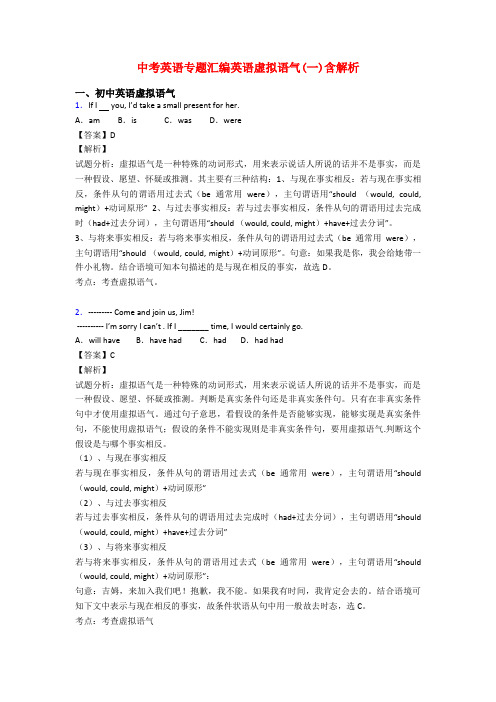
中考英语专题汇编英语虚拟语气(一)含解析一、初中英语虚拟语气1.If I you, I’d take a small present for her.A.am B.is C.was D.were【答案】D【解析】试题分析:虚拟语气是一种特殊的动词形式,用来表示说话人所说的话并不是事实,而是一种假设、愿望、怀疑或推测。
其主要有三种结构:1、与现在事实相反:若与现在事实相反,条件从句的谓语用过去式(be通常用were),主句谓语用“should (would, could, might)+动词原形” 2、与过去事实相反:若与过去事实相反,条件从句的谓语用过去完成时(had+过去分词),主句谓语用“should (would, could, might)+have+过去分词”。
3、与将来事实相反:若与将来事实相反,条件从句的谓语用过去式(be通常用were),主句谓语用“should (would, could, might)+动词原形”。
句意:如果我是你,我会给她带一件小礼物。
结合语境可知本句描述的是与现在相反的事实,故选D。
考点:考查虚拟语气。
2.--------- Come and join us, Jim!---------- I’m sorry I can’t . If I _______ time, I would certainly go.A.will have B.have had C.had D.had had【答案】C【解析】试题分析:虚拟语气是一种特殊的动词形式,用来表示说话人所说的话并不是事实,而是一种假设、愿望、怀疑或推测。
判断是真实条件句还是非真实条件句。
只有在非真实条件句中才使用虚拟语气。
通过句子意思,看假设的条件是否能够实现,能够实现是真实条件句,不能使用虚拟语气;假设的条件不能实现则是非真实条件句,要用虚拟语气.判断这个假设是与哪个事实相反。
(1)、与现在事实相反若与现在事实相反,条件从句的谓语用过去式(be通常用were),主句谓语用“should (would, could, might)+动词原形”(2)、与过去事实相反若与过去事实相反,条件从句的谓语用过去完成时(had+过去分词),主句谓语用“should (would, could, might)+have+过去分词”(3)、与将来事实相反若与将来事实相反,条件从句的谓语用过去式(be通常用were),主句谓语用“should (would, could, might)+动词原形”:句意:吉姆,来加入我们吧!抱歉,我不能。
(英语)初中英语专题汇编虚拟语气(一)含解析
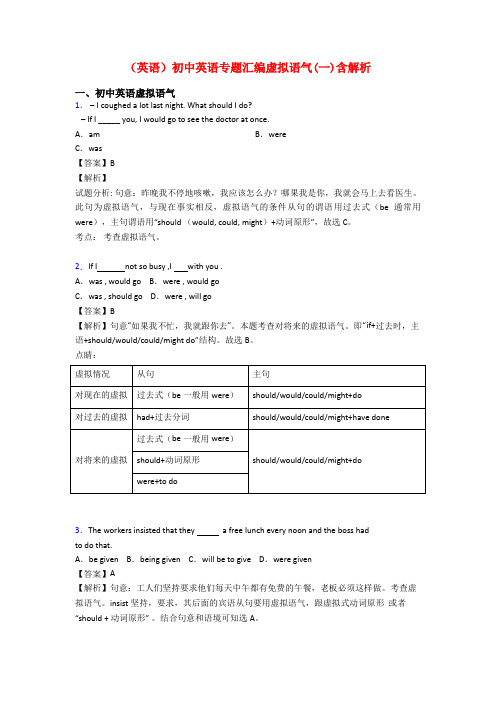
(英语)初中英语专题汇编虚拟语气(一)含解析一、初中英语虚拟语气1.– I coughed a lot last night. What should I do?– If I _____ you, I would go to see the doctor at once.A.am B.wereC.was【答案】B【解析】试题分析: 句意:昨晚我不停地咳嗽,我应该怎么办?哪果我是你,我就会马上去看医生。
此句为虚拟语气,与现在事实相反,虚拟语气的条件从句的谓语用过去式(be通常用were),主句谓语用“should (would, could, might)+动词原形”,故选C。
考点:考查虚拟语气。
2.If I not so busy ,I with you .A.was , would go B.were , would goC.was , should go D.were , will go【答案】B【解析】句意“如果我不忙,我就跟你去”。
本题考查对将来的虚拟语气。
即“if+过去时,主语+s hould/would/could/might do”结构。
故选B。
点睛:3.The workers insisted that they a free lunch every noon and the boss hadto do that.A.be given B.being given C.will be to give D.were given【答案】A【解析】句意:工人们坚持要求他们每天中午都有免费的午餐,老板必须这样做。
考查虚拟语气。
insist坚持,要求,其后面的宾语从句要用虚拟语气,跟虚拟式动词原形或者“should + 动词原形” 。
结合句意和语境可知选A。
4.--- If I_______ one million dollars, I would give it to medical research.---If I _______ you, I would give it to charity.A.will have, am B.would have, was C.had, were D.have, is【答案】C【解析】考察虚拟语气。
英语总复习常见虚拟语气最全总结(1)

英语总复习常见虚拟语气最全总结(1)一、初中英语虚拟语气1.—I don’t know what to wear at the party.— If I you, I would wear a shirt and a tie.A.am B.is C.were D.was【答案】C【解析】试题分析:if从句的虚拟语气,对于现在的虚拟用一般过去式,be动词都用were,故选C.句意:——我不知道聚会该穿什么。
——如果我是你,我会穿一件衬衫加一条领带。
故选C 考点:if条件句的虚拟语气点评:if条件句的虚拟语气,是中考要求掌握的知识点,分为三种情况:表示与现在事实相反的情况,从句谓语动词用一般过去式(be用were),主句谓语动词用should/would/could/might +do;2.表示与过去的事实相反的情况,从句谓语动词用过去完成时,主句谓语动词用should/would/could/might+have done;3.表将来的事实相反的情况,从句谓语动词用should+动词/did/were to do,主句谓语动词用should/would/could/might +do。
2.Luckily, he wasn’t driving fast at the time of accident; otherwise, I am sure, it _______ a more serious accident.A.would be B.were C.would have been D.had been【答案】C【解析】【详解】句意:幸运的是,事故发生时他没有开快车;否则,我相信,这将是一个更严重的事故。
考查虚拟语气。
根据“wasn’t driving”是过去进行时,所以此处是对过去的虚拟,主句时态应用情态动词+have done,故选C。
3.Yesterday, the storm delayed us. _______ the storm, we would have been here in time. A.But for B.If it were not for C.But that D.Unless【答案】A【解析】【详解】句意:昨天暴风雨耽搁了我们。
外研版英语【初中英语】虚拟语气知识点总结(1)

外研版英语【初中英语】虚拟语气知识点总结一、初中英语虚拟语气1.–I argued with my best friend. What should I do?--If I ________ you, I would say sorry to her.A.am B.was C.are D.were【答案】D【解析】试题分析:句意:我和我最好的朋友吵架了。
我该怎么办?如果我是你,我就对她说对不起。
虚拟语气用来表示说话人的主观愿望或假想,所说的是一个条件,不一定是事实,或与事实相反。
在虚拟条件语气句中,表示与现在事实相反的事实,条件从句中的谓语动词用过去式(be用were不用was),主句谓语动词为“would+原形动词”,所以选D。
考点:考查虚拟语气。
2. If I ______ you, I _____the job.A.was; will take B.was; would take C.were; would take D.were; will take 【答案】 C【解析】试题分析:句意:如果我是你,我就要这份工作。
If引导的句子是愿望时,用过去式表示,而且系动词用were,主句用would加原形。
故选C。
考点: 考查虚拟语气的用法。
3.— What would you do if you _______ a million dollars?— I would give it to charity.A.have B.had C.will have D.would have【答案】B【解析】试题分析:句意:-如果你有一百万美元你会做什么?-我会把它捐给慈善事业。
have 有;had 过去式;will have 一般将来时;would have 过去将来时。
根据句意可知,这里表示的是一个假设的问题,在if引导的条件状语从句中应该用虚拟语气,动词用过去式,故选B。
考点:考查虚拟语气。
4.If I _______ you, I _______ go there.A.is; will B.is; would C.were; would D.was; will【答案】C【解析】本题考查虚拟语气,if引导的与现在事实相反的虚拟语气。
虚拟语气一
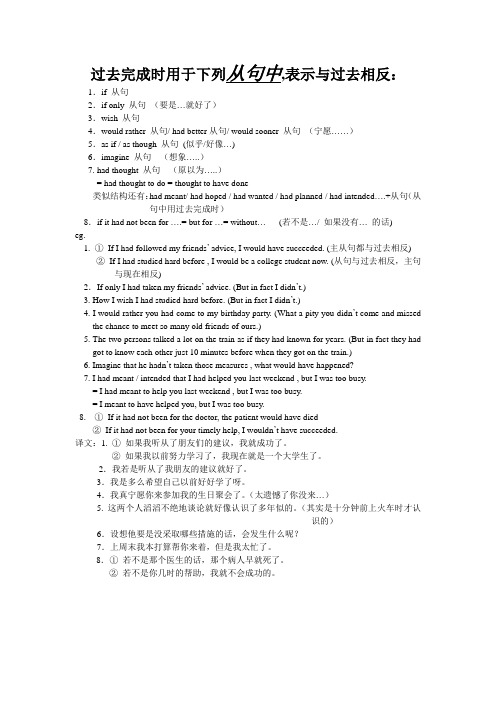
过去完成时用于下列从句中,表示与过去相反:1.if 从句2.if only 从句(要是…就好了)3.wish 从句4.would rather 从句/ had better从句/ would sooner 从句(宁愿……)5.as if / as though 从句(似乎/好像…)6.imagine 从句(想象…..)7. had thought 从句(原以为…..)= had thought to do = thought to have done类似结构还有:had meant/ had hoped / had wanted / had planned / had intended….+从句(从句中用过去完成时)8.if it had not been for ….= but for …= without…(若不是…/ 如果没有…的话)eg.1. ①If I had followed my friends’ advice, I would have succeeded. (主从句都与过去相反)②If I had studied hard before , I would be a college student now. (从句与过去相反,主句与现在相反)2.If only I had taken my friends’ advice. (But in fact I didn’t.)3. How I wish I had studied hard before. (But in fact I didn’t.)4. I would rather you had come to my birthday party. (What a pity you didn’t come and missedthe chance to meet so many old friends of ours.)5. The two persons talked a lot on the train as if they had known for years. (But in fact they hadgot to know each other just 10 minutes before when they got on the train.)6. Imagine that he hadn’t taken those measures , what would have happened?7. I had meant / intended that I had helped you last weekend , but I was too busy.= I had meant to help you last weekend , but I was too busy.= I meant to have helped you, but I was too busy.8. ①If it had not been for the doctor, the patient would have died②If it had not been for your timely help, I wouldn’t have succeeded.译文:1. ①如果我听从了朋友们的建议,我就成功了。
大学英语四级考试语法系列讲座--虚拟语气1

大学英语四级考试系列讲座虚拟语气中国地质大学(武汉)外语学院许峰虚拟语气是英语动词的一种特殊形式,表示说话人主观上所说的话并不是事实,而是一种假设、愿望、建议、请求、命令、空想、猜测、必要性和可能性等。
虚拟语气是英语学习中的一个难点,也是大学英语测试中的重要的语法考点之一。
测试内容涉及到虚拟语气的方方面面——从在含非真实条件的主从句中的应用,到在各种从句(主语从句、宾语从句、表语从句、同位语从句、状语从句、定语从句)中的应用。
由于虚拟语气表达的是一种与事实相反的行为或状态,其谓语动词的变化不同于陈述语气,这也是学生感到困惑和容易出错的地方。
解此类试题时,关键是要迅速发现解题信息词,确定虚拟语气类型,然后按各类虚拟语气的特定表达方式,或根据结构或题句中的其他暗示,确定动词的形式。
第一节虚拟条件句一、虚拟语气在非真实条件句中的应用非真实条件句表示不大可能或不可能发生或实现的假设,句中的条件从句与结果主句皆须用虚拟语气。
其虚拟语气的时态可用下表表示:例1:If we left now, we should arrive in good time. 假如我们现在就走的话,我们就能及时到达。
(与现在事实相反)例2:If he had been here, he might have been able to help us.如果他在这里,他也许能帮助我们。
(与过去事实相反)例3:If you did that again, we wouldn't allow you to work with us.如果你再那么干,我们就不让你跟我们一起工作了。
(与将来事实相反)经典考点1:If the whole operation be fore hand, a great deal of time and money would have been lost.(CET-4,1999年6月)A)was not planned B)has not been plannedC)had not been planned D)were not planned巧解答案C。
虚拟语气(1)(2)

虚拟语气(一)-if引导的虚拟条件句虚拟语气(Subjunctive Mood)这一语法项目是各类英语考试中测试的重点之一。
虚拟语气是一种特殊的动词形式,用来表示说话人所说的话并不是事实,而是一种假设、愿望、怀疑或推测。
首先要判断是真实条件句还是非真实条件句, 只有在非真实条件句中才使用虚拟语气。
通过句子意思,看假设的条件是否能够实现,能够实现是真实条件句,不能使用虚拟语气;假设的条件不能实现则是非真实条件句,要用虚拟语气.判断这个假设是与哪个时间的事实相反。
通常有三种情况:①与过去事实相反②与现在事实相反③与将来事实可能相反最基本的虚拟语气句型:1. 虚拟现在时表示与现在事实相反的假设,其if从句的谓语形式用动词的过去式(be一般用were),主句用would/ should/ could/ might +动词原形。
If places were alike, there would be little need for geographers.2. 虚拟过去时是表示与过去事实相反的假设,if 从句的谓语形式用过去完成时的形式即had+过去分词,主句用would / should / could / might + have +过去分词。
If he had known your address yesterday, he would have telephoned you.3. 虚拟将来时是表示对将来实现的可能性很小的或不确定的假设。
If从句的谓语形式用一般过去式或用were to/should +动词原形,主句用would /should/could /might+动词原形。
If he were to leave today, he would get there by Friday.谓语动词形式见下表:即时演练:1. I didn’t see your sister at the meeting. If she ______, she would have met my brother.A. has comeB. did comeC. cameD. had come2. It’s quite impossible that it’ll rain tomorrow. But if it ______, I would still go to the park.A. should rainB. would rainC. rainsD. had rained3. I _______ if she _______ me.A. would have overslept, didn’t callB. would have overslept, hadn’t calledC. overslept, hadn't calledD. would overslept, didn't call4. The new airport _____ if they had not stopped working on it.A. would completeB. had been completedC. had completedD. would have been completed5.If there were no subjunctive mood, English ______ much easier.A. could have beenB. would beC. will beD. would have been6.Should it rain, the crops ______ .A. would be savedB. would have been savedC. will be savedD. had been saved7.You _______ earlier. The bus left a moment ago.A. would comeB. should have comeC. may comeD. have come8.You _______ such a serious mistake if you had followed his adviceA. may not makeB. might have not madeC. shouldn't have madeD. might not have made9.We ________ the work on time without your help.A. hadn't had finishedB. didn't have finishedC. couldn't have finishedD. can't have finished10. A few minutes earlier and we _____ the train.A. have caughtB. had caughtC. could have caughtD. were to catch11. If it were not for the fact that you _____ ill, I would ask you to do this right now.A. wereB. had beenC. areD. should be12. If it _______ so hard, we'd go to town.A. isn't rainingB. doesn'tC. weren't rainingD. isn't going to rain13. —If he ______, he _______ that food.—Luckily he was sent to the hospital immediately.A. was warned; would not takeB. had been warned; would not have takenC. had been warned; had not takenD. would have been warned; had not taken14. ---If I had a lot of money, I______ around the world.---Stop dreaming! Just do what you should do!A. were to travelB. would travelC. could have traveledD. will travel15. This printer is of good quality. If it ______ break down within the first year, we would repair it at our expense.A. wouldB. shouldC. couldD. might虚拟语气(二)-if引导的虚拟条件句的特殊情况I. 错综时间虚拟语气若主句从句所指的时间不一致,即条件从句表示与过去事实相反,主句表示与现在事实相反;或者条件从句表示与现在事实相反,主句表真实情况,则从句中应采用与具体时间相对应的虚拟形式。
英语虚拟语气完整归纳(1)
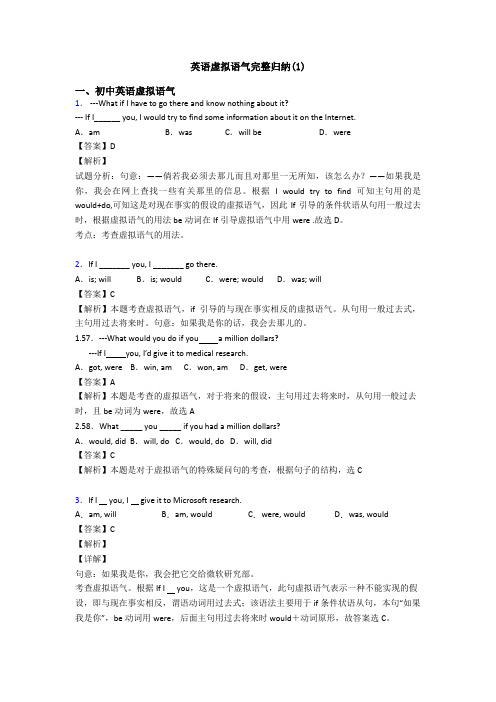
英语虚拟语气完整归纳(1)一、初中英语虚拟语气1. ---What if I have to go there and know nothing about it?--- If I______ you, I would try to find some information about it on the Internet.A.am B.was C.will be D.were【答案】D【解析】试题分析:句意:——倘若我必须去那儿而且对那里一无所知,该怎么办?——如果我是你,我会在网上查找一些有关那里的信息。
根据I would try to find可知主句用的是would+do,可知这是对现在事实的假设的虚拟语气,因此If引导的条件状语从句用一般过去时,根据虚拟语气的用法be动词在If引导虚拟语气中用were .故选 D。
考点:考查虚拟语气的用法。
2.If I _______ you, I _______ go there.A.is; will B.is; would C.were; would D.was; will【答案】C【解析】本题考查虚拟语气,if引导的与现在事实相反的虚拟语气。
从句用一般过去式,主句用过去将来时。
句意:如果我是你的话,我会去那儿的。
1.57.---What would you do if you a million dollars?---If I you, I’d give it to medical research.A.got, were B.win, am C.won, am D.get, were【答案】A【解析】本题是考查的虚拟语气,对于将来的假设,主句用过去将来时,从句用一般过去时,且be动词为were,故选A2.58.What _____ you _____ if you had a million dollars?A.would, did B.will, do C.would, do D.will, did【答案】C【解析】本题是对于虚拟语气的特殊疑问句的考查,根据句子的结构,选C3.If I you, I give it to Microsoft research.A.am, will B.am, would C.were, would D.was, would【答案】C【解析】【详解】句意:如果我是你,我会把它交给微软研究部。
(英语)中考英语总复习--虚拟语气含解析
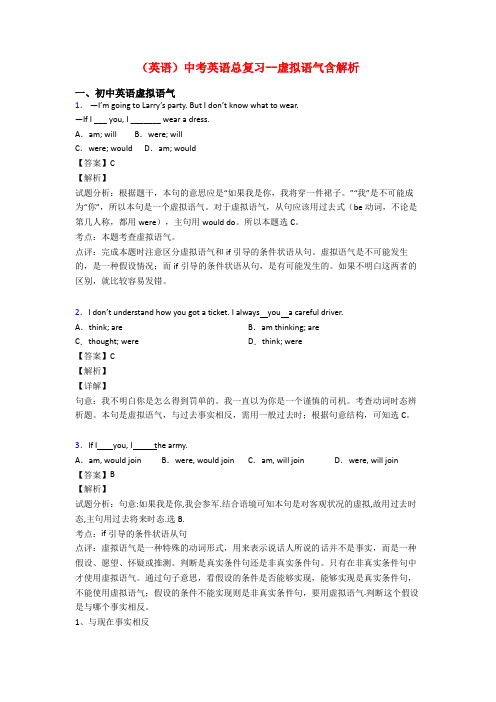
(英语)中考英语总复习--虚拟语气含解析一、初中英语虚拟语气1.—I’m going to Larry’s party. But I don’t know what to wear.—If I ___ you, I _______ wear a dress.A.am; will B.were; willC.were; would D.am; would【答案】C【解析】试题分析:根据题干,本句的意思应是“如果我是你,我将穿一件裙子。
”“我”是不可能成为“你”,所以本句是一个虚拟语气。
对于虚拟语气,从句应该用过去式(be动词,不论是第几人称,都用were),主句用would do。
所以本题选C。
考点:本题考查虚拟语气。
点评:完成本题时注意区分虚拟语气和if引导的条件状语从句。
虚拟语气是不可能发生的,是一种假设情况;而if引导的条件状语从句,是有可能发生的。
如果不明白这两者的区别,就比较容易发错。
2.I don’t understand how you got a ticket. I always you a careful driver.A.think; are B.am thinking; areC.thought; were D.think; were【答案】C【解析】【详解】句意:我不明白你是怎么得到罚单的。
我一直以为你是一个谨慎的司机。
考查动词时态辨析题。
本句是虚拟语气,与过去事实相反,需用一般过去时;根据句意结构,可知选C。
3.If I you, I the army.A.am, would join B.were, would join C.am, will join D.were, will join【答案】B【解析】试题分析:句意:如果我是你,我会参军.结合语境可知本句是对客观状况的虚拟,故用过去时态,主句用过去将来时态.选B.考点:if引导的条件状语从句点评:虚拟语气是一种特殊的动词形式,用来表示说话人所说的话并不是事实,而是一种假设、愿望、怀疑或推测。
- 1、下载文档前请自行甄别文档内容的完整性,平台不提供额外的编辑、内容补充、找答案等附加服务。
- 2、"仅部分预览"的文档,不可在线预览部分如存在完整性等问题,可反馈申请退款(可完整预览的文档不适用该条件!)。
- 3、如文档侵犯您的权益,请联系客服反馈,我们会尽快为您处理(人工客服工作时间:9:00-18:30)。
3、可能违背将来事实的假设 这里指的是将来不大可能发生的假设,或者虽有可能发生, 说话人主观上不希望发生的假设。这种假设相当于汉语中 常用的“万一”,“居然”,“竟然”等含义。例如: If he should fail, we would encourage him to try again. 万一他失败,我们就鼓励他再试一次。 If I were to do it, I would do it in a different way. 要是我来做这件事,我会是另外一种做法。 We would wipe them out if they should attract us. 如果他们胆敢进攻,我们就将他们消灭。 If it should rain tomorrow, what could we do? 万一明天下雨,我们能做些什么呢? If the rocket should fail in a few seconds, it would certainly explode.如果火箭几秒钟内竟然向下坠落,那就一定会爆炸。
5、连接词 if 的省略 如果条件从句的谓语包含有had, should 或 were,有时 if 可以 省略。这时had,should 或 were 要移到主语前面,形成倒装。 (这种句型主要见于书面形式。) Had he not been ill, he might have come. 要不是生病,他是会来的。 Were I to do it, I would do it in a different way. 要是我来做这件事,我会是另外一种做法。 Should it rain tomorrow, what could we do. 万一明天下雨,我们能做些什么呢? Were it not for his help, we couldn’t have got over the difficulties. 如果不是因为他的帮助,我们就克服不了这些困难。
虚拟语气
By Lynn
虚拟语气(subjunctive mood)是谓语动词的 一种形式,用来表示非真实的假设,或者用来表 示命令、建议或说话人的主观愿望。
一、非真实条件中的虚拟语气 非真实条件就是违背事实情况的假设,包括违背现在事 实的假设,违背过去事实的假设,以及将来不可能发生或 者虽然有可能发生但说话人主观上不希望发生的假设。最 后这一种假设简称为违背将来事实的假设。在这三种情况 下,条件从句和主句中的谓语动词采取下列虚拟形式。
4、介词短语表示的假设条件 有时不用 if 引导条件从句,而用介词短语表示违背事实的 假设条件,这时句中谓语动词仍用虚拟语气形式。例如: Without air, there would be no wind or clouds. 没有空气就不会有风,也不会有云。 In that case we could have done the work better. 如果是那样的话,我们本可能把工作做得更好些的。 But for the storm, we should have arrived earlier. 要是没有碰上暴雨,我们还会早一点到达。
二、其他从句中的虚拟语气 在表示建议、命令、要求以及表示“重要性”和“紧迫 性”等含义的主语从句、宾语从句、表语从句和同位语从句 中,谓语动词常用虚拟语气,由“动词原形”或“should+ 动词原形”构成。现分述如下: 1、主语从句 在下列结构的主语从句中,谓语动词用虚拟语气。 It is necessary that…(有必要…) It is imperative that…(必须… ,…是紧要的) It is important that…(重要的是…) It is essential that…(必须… ,…是必要的) It is advisable that…(最好… ,…是理想的) It is better that…(最好…)
2、违背过去事实的假设 If I had left a little earlier, I would have caught the train. 我要是早点动身就赶上火车了。 If she hadn’t taken your advice, she would have made a bad mistake. 她要不是听了你的劝告,就要犯大错了。 She would have come if she hadn’t been so busy. 要是不忙,她就来了。 I could have done it better if I had been more careful. 我要是细心一点,是可以做得更好的。 If he hadn’t been ill, he might have come. 要不是生病,他是会来的。
条件从句 违背现在 过去式
主句 should/ wo过去分词
should have/ would have+过去分词
违背将来
1)should+动词原形 should/ would +动词原 2)were+动词不定式 形
虚拟语气中主句中的第一人称用should,第二、第三人 称用would。但在美国英语中,第一人称用would。此外, 主句中也可用情态动词could或might代替should或would。 在条件从句中,如果动词是be,在违背现在事实时,各人 称都用were。(但在非正式文体中,特别是口语中,第一、 三人称用was的时候也不少。)在违背将来事实的条件从 句中,should+动词原形及were+不定式两种谓语动词形式 适用于所有人称。
1、违背现在事实的假设 If the earth had no gravity, the moon would fly to the sun. 假如地球没有引力,月球就要向太阳飞去。 If I were (was) you, I would reconsider their proposal. 我要是你,我就要重新考虑他们的建议。 If he were (was) you, everything would be all right. 要是他在这儿,一切问题都会解决。 What would you do if you were in his position? 要是你处在他的位置,你会怎么办? If it weren’t (wasn’t) raining, we wouldn’t stay in door. 要是现在不下雨,我们就不会呆在屋里了。
